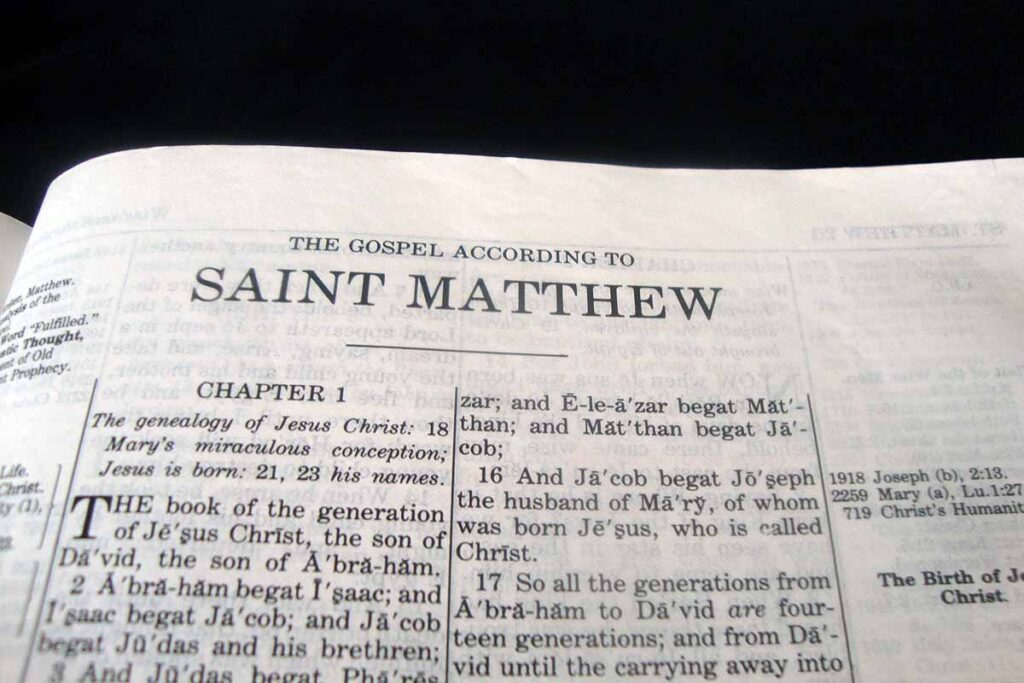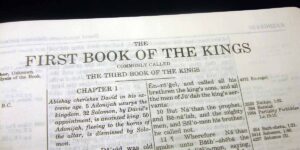The gospel of Matthew begins with the people of Israel were waiting for the Messiah, their king. Matthew begins his book by showing how Jesus Christ was a descendant of David. But Matthew goes on to show that God did not send Jesus to be an earthly king, but a heavenly king. His kingdom would be much greater than David’s because it would never end. Even at Jesus’ birth, many recognized him as a king. Herod, the ruler, as well as Satan, was afraid of Jesus’ kingship and tried to stop him, but others worshipped him and brought royal gifts. We must be willing to recognize Jesus for who he really is and worship him as king of our lives.
Jesus gave the Sermon on the Mount, directions for living in his kingdom. He also told many parables about the difference between his kingdom and the kingdoms of the earth. Forgiveness, peace, and putting others first are some of the characteristics that make one of the great in the future kingdom of God. And to be great in God’s kingdom, we must live by God’s standards right now. Jesus came to show us how to live as faithful subjects in his kingdom.
Jesus was formally presented to the nation of Israel, but he was rejected. How strange for the king to be accused, arrested, and crucified. But Jesus demonstrated his power even over death through his resurrection and gained access for us into his kingdom. With all this evidence that Jesus is God’s Son, we, too, should accept him as our Lord.
Writer of the Gospel of Matthew
Although this Gospel does not identify its author, early church tradition attributes it to Matthew, the apostle, and a former tax collector. Other than his name and occupation, little is known about him. Tradition says that for fifteen years following the resurrection of Jesus he preached in Palestine and then conducted missionary campaigns in other nations.
Date Written
The precise date of the writing of the gospel of Matthew is not known. Some scholars argue for a date later than the destruction of Jerusalem in A. D. 70, since Jesus alludes to this event in 24:1-28. Of course, such a conclusion is warranted only if one denies Jesus’ ability to predict the future. In light of Irenaeus’s assertion that Matthew composed his Gospel while Peter and Paul were still living, it is traditionally dated to the late ’50s or early ’60s.
Purpose of the Gospel of Matthew
The purpose of the gospel of Matthew was to present the Lord Jesus Christ as Israel’s king.
Matthew was “The book of the generation of Jesus Christ, the son of David, the son of Abraham” (Matthew 1:1). It was the book of Jesus Christ as the perfect Israelite – the rightful king of Israel. Christ was presented as the inheritor of David’s throne, having traced His royal lineage from Abraham (the patriarch of the nation) to David (the patriarch of the throne) to Joseph (the husband of Mary, but not the father of Jesus). As the son of Abraham, Jesus represented the nation of Israel to God (as the Son of man).
Matthew was the book of being “in Israel.” From the call of Abraham, God had chosen a people for His name. This family that became a nation had a greater revelation of God than the other nations. They also had greater accompanying privileges, as well as greater responsibility before God. The Jews living during the earthly ministry of Jesus were all under the Mosaic law, a national code of conduct that had long since been added for Israel’s observance. The law was not meant to be a means of salvation, for a Jew was born into a relationship with Jehovah ( as servants of God). The law was the revelation of a righteous way of living for those who were already redeemed by God (at the Passover out of Egypt) and, therefore, belonged to Him. However, the Israelite was not guaranteed eonian life (resurrection life in the kingdom of God). He was expected to fear God and keep His commandments (Ecclesiastes 122:13). If he did not, God could, and probably would cut him out of Israel, and he would lose all the privileges that he once had by being a part of that nation.
Today, when those who have not understood the right division have gone to the Bible to determine if there is eternal security and have started the gospel of Matthew, they come out of the book assured that one certainly can lose his salvation. The reason is that a “servant,” as described in this book, received his position by means of birth as an Israelite, yet upon proving to be an unfaithful servant, he could be cast into outer darkness, where there is weeping and gnashing of teeth (great sorrow and regret at having lost a place in the kingdom as a Jew). He found no security at all in being “in Israel.” Having been born a servant of God, he did not have to have faith at all in order to attain it. The only determination was whether or not he would be deemed a faithful servant. This is not at all like being “in Christ,” as set forth in Ephesians – the position which can only be a reality through one’s personal faith in the Lord Jesus Christ, regarding Who He is and what He did that procured salvation for us.
Theological Contribution
Matthew’s main subject is the “Kingdom of Heaven” or “Kingdom of God.” This kingdom is mentioned 51 times in the Gospel of Matthew, twice as often as in any other gospel. The kingdom is already here in Jesus, but it is not yet fulfilled. The kingdom extends like a fishing net, gathering people from every part of society, offering a new life in the life-changing presence of God, and it excludes any and all competitors for its allegiance.
The kingdom of God means the rule or reign of God – in the entire universe, in the world, and in our hearts. The primary indication of the presence of the kingdom in the world is the transformation of life, both individually and socially.
Special Considerations
The Gospel of Matthew has at least five special considerations that will be mentioned briefly here:
- Matthew sought to prove to the Jews that Jesus was the Christ, the fulfillment of the Old Testament prophecy. A recurring statement that occurs in this gospel is, “All this was done that it might be fulfilled which was spoken by the Lord through the prophet”.
- Matthew has a special interest in the church, which by the time this gospel was written had become the dominant factor in the lives of Christians. Indeed, Matthew is the only gospel to mention the word “church”.
- Matthew has a strong interest in eschatology (the doctrine of last things) – that is, in the second coming of Jesus, the end of the age, and the final judgment.
- Matthew has a great interest in the teachings of Jesus, especially concerning the Kingdom of God.
- Matthew writes to show that Jesus is the King to whom God has given power and authority to redeem and to judge humankind.
Recommended Bible Study Resources
ESV Study Bible – Study Bibles give you a deeper understanding of God’s Word with tools for life application like commentary, maps, charts, concordance, and study notes. Search our popular translations- NIV, ESV, NKJV, KJV and more!
Believer’s Bible Commentary: Second Edition – A Bible commentary is a written, systematic series of explanations and interpretations of Scripture. Commentaries often analyze or expound on individual books of the Bible, chapter by chapter and verse by verse. Some commentary works provide analysis of the whole of Scripture.
The New Strong’s Expanded Exhaustive Concordance of the Bible – The best concordance for word study! This exclusive new edition of a legendary classic puts generations of biblical research at your fingertips. A valuable tool for pastors, teachers, and students of the Bible.
Vine’s Complete Expository Dictionary of Old and New Testament Words – This classic word study resource allows you to study the meaning of biblical words in the original languages without spending years learning Greek or Hebrew. A great resource for students, seasoned pastors, and anyone who enjoys biblical word studies–even if they have little to no formal training in Hebrew or Greek.
Halley’s Bible Handbook – The beloved and classic Bible companion has been thoroughly updated, while retaining its time-honored features and Dr. Halley’s highly personal style, to offer even greater clarity, insight, and usefulness.
Click here to view or print the above Bible outline on the “Gospel of Matthew“








